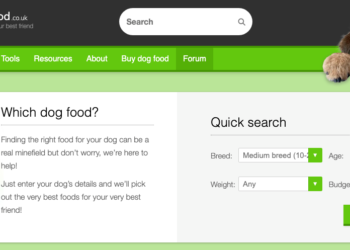[ad_1]
If your dog suffers from stress and anxiety you will want to know how to calm a dog down. There are some short-term strategies but also long-term things you can do to help
Just like with humans, there are many things that can cause a dog to feel stressed… and all of these are very familiar as they cause us stress too: fight flight or freeze (the response to fear), over-stimulation, separation anxiety, being over-tired, new situations, new people, uncertainty, illness, mis-communication. Your ultimate aim with dog stress is to achieve self-calming –- giving them the opportunity to calm themselves rather than rely on you.
What is making your dog anxious?
Work out what is causing your dog stress and anxiety. Is it something in the home? Being left alone? Something outside? Certain noises? Types of weather? Keeping a stress diary may help you work out what the key triggers are – just note down time, day, environment and behaviour and regularly review it to see trends. And remember: your mood affects their mood –- if you are stressed they will pick up on it. But equally, if you are calm and quiet they will pick up on that too. So add your mood to the diary to check you are not unwittingly passing on your own anxiety.
Look for early signs of stress to try and head-off full blown panic, biting or barking. A stressed dog will often yawn or pant and put their ears back. They may show the whites of their eyes. A nervous dog will often hold its tail down. You can use this understanding of doggy body language to your advantage: e.g. sit down low at their level, don’t stare at them –- looking away slowly communicates trust. Understanding their language is always going to be useful.
Tips for calming an anxious dog
Some other ideas for helping calm a dog down:
- Go for walks in quiet areas. Exercise is a great stress reliever, but maybe the place you are walking is too full of other dogs, noises, distractions, for your dog to calmly enjoy their walk
- Let them sniff. Sometimes this can be extremely boring for you on a walk but for your dog sniffing is a way of finding out what is happening in the world (and we all know how stressful the uncertain can be) and also physiologically calms them down as it releases dopamine in their brain, which is the hormone associated with reward and satisfaction
- Give them regular attention and affection. Sounds obvious but it’s easy to find yourself focusing on them more when they are stressed and leaving them to it when they are calm. If you make an effort to show them attention throughout the day and in all situations, they will quickly learn that they are not reliant on being stressed to get a cuddle
- If you have a dog who suffers from separation anxiety, then get them some more regular company –- a dog walker, a dog sitter, a neighbour… anyone who can break up the day while you are out (and maybe even feed them a few Poppy’s Picnic dog treats).. It doesn’t have to be a human! Many people find their dogs are calmer at home if they leave a radio on while they are out
Some breeds are just more on high alert than others, so if you are choosing a new dog and know you won’t deal well with a naturally anxious dog, then consider your choice of dog carefully. Very mixed breed dogs will often suffer less from genetic characteristics than pure breeds or a mix of two pedigree breeds. Equally consider where a puppy comes from (always a Kennel Club registered breeder). If you have a busy house with lots of people coming and going, search out a puppy from another busy home. If you have young children or visiting grandchildren, find one from a house with young children. And so on. If they have grown up with these things in their lives, they are less likely to react to them in the future.
[ad_2]
Louise Mackintosh
2022-05-03 10:43:32
Source :https://poppyspicnic.co.uk/blogs/raw-pet-food/how-to-calm-a-dog-down

















